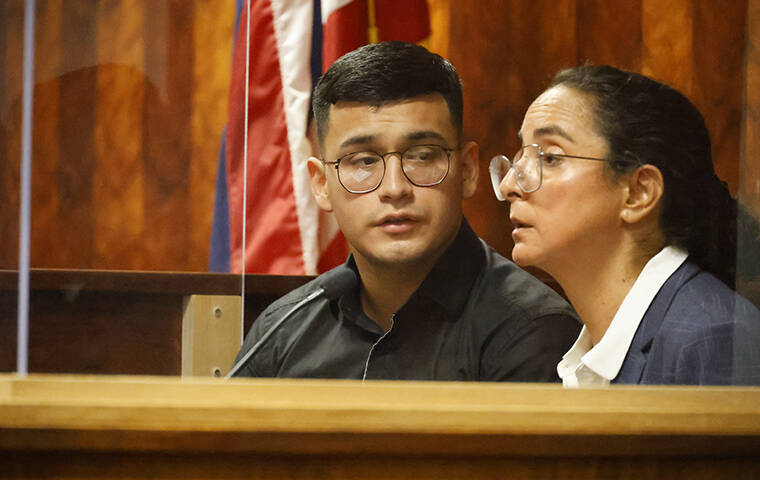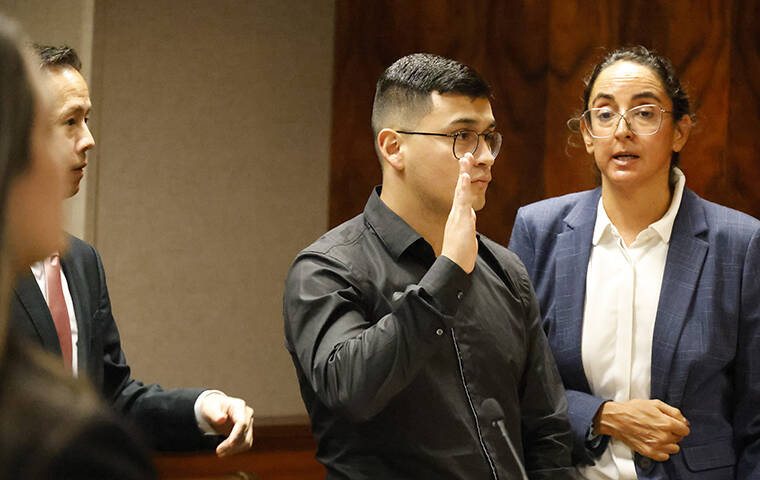Defendant in Hawaii Loa Ridge murder case seeks to withdraw guilty plea

CRAIG T. KOJIMA / CKOJIMA@STARADVERTISER.COM
Juan Baron, 25, was scheduled to be sentenced Sept. 25 but instead wanted to change his plea to not guilty, which he did in a hearing Monday. His Spanish-language interpreter is pictured with him.

CRAIG T. KOJIMA / CKOJIMA@STARADVERTISER.COM
Juan Baron, who on Monday changed his plea to not guilty, is scheduled to be back in court Oct. 25.


The 25-year-old Colombian man who took a plea deal March 18 in the murder of a 73-year-old man in his luxury Hawaii Loa Ridge house says his then-attorneys told him that if he didn’t take the deal, he would die in prison.
Juan Baron took the stand Monday and, through a Spanish-language interpreter, testified what his understanding was of his options if he didn’t take the plea deal: “I was going to spend the rest of my life in jail. After 30 years, just like in the movies, they can apply the electric chair.”
Randall Hironaka, Baron’s current court-appointed attorney, had filed a motion to withdraw Baron’s guilty plea. The motion had been scheduled to be heard at his sentencing hearing on Sept. 24 before Circuit Judge Catherine Remigio.
Baron testified that his first language is Spanish and that although he did learn some English from weekly classes in his native Colombia, he began his most intensive learning when he arrived in the U.S. in 2018, living in Houston. He said he came to Hawaii in January 2022. He was indicted April 13, 2022.
Baron also testified that his previous attorneys, Myles Breiner and his associate, Kyle Dowd, did not have a Spanish-language interpreter for him when explaining the details of the plea deal.
Hironaka asked his client whether he meant that he thought he would be subject to being put to death.
Don't miss out on what's happening!
Stay in touch with breaking news, as it happens, conveniently in your email inbox. It's FREE!
Baron said, “Yes.”
Hironaka asked whether his then-attorneys discussed with him that there was no death penalty in Hawaii.
Baron then asked Hironaka, “I’m asking you, there’s no death penalty?”
Baron pleaded guilty in March to killing Gary Ruby, whose body was found concealed in concrete in a bathtub in Ruby’s house, admitted to taking unauthorized control over Ruby’s house at 357 Lelekepue Place and over his gold Audi, all of which occurred between Jan. 19 and March 7, 2022.
The state offered not to seek an extended term of sentencing if Baron pleaded guilty to second-degree murder, identity theft and two counts of felony theft.
Second-degree murder has a sentence of life imprisonment with the possibility of parole.
The plea deal would have meant that the state would not ask for life without the possibility of parole, which Deputy Prosecutor Ayla Weiss could have asked for since the victim was considered an older person by law as he was more than 59 years of age.
Baron said that Dowd told him that since he had worked with Weiss before, “it was the only deal I would get so I wouldn’t die in jail.”
While on the stand, Baron testified that he recalls Breiner filing a motion to dismiss the case on his behalf July 25, 2022.
He said his understanding was that the prosecutor did some illegal things, “so I probably would get to go home … that they were going to sort of cancel the case.”
Breiner had raised the issue of prosecutorial misconduct regarding the former deputy prosecutor on the case, who headed the Elder Abuse unit, for showing photos of Ruby in a PowerPoint presentation. The previous deputy prosecutor was eventually terminated.
Baron said he recalls the motion to dismiss the case scheduled for Aug. 29, 2023, as well as four additional hearings.
However, Baron, when shown Breiner’s plea offer letter to the state dated Oct. 17, 2023, asked, “The date is wrong, isn’t it?”
He testified he had no knowledge a plea agreement was being negotiated on his behalf.
Baron said he was given less than a week to decide after a 30-minute meeting with Dowd, and a second meeting the next day with him and Breiner.
A letter from Breiner’s firm offered the option to either accept the state’s counter offer, which the attorneys urged him to take; continue to litigate and Breiner’s firm would withdraw; or die in jail.
He said he was given just over a week to decide.
Baron alleges that during his guilty plea the interpreter, Cristina Arsuaga, translated the court’s question to “if I was on drugs or alcohol.” He said he thought it meant only illegal drugs and alcohol.
Hironaka asked whether he was taking any medication.
Baron said he takes medication for tuberculosis, which makes his heart beat fast, and Hironaka asked whether it causes anxiety, to which he said yes but did not know whether it affects his thinking.
Hironaka asked Baron a question to clarify whether he understood the consequence of changing his plea means that “if your request is granted by the court, you would be giving up that protection (of the plea agreement). You understand that? You will no longer have that protection.”
“Yes,” he said.
Because time ran out for the hearing due to various reasons, Remigio continued the hearing to Oct. 25.
The judge also heard and denied the defendant’s motion to seal the hearing on his motion to withdraw his plea, which would have essentially locked out the news media and the public from the hearing.
The judge denied that motion, saying, in part, that she found no compelling interest that would likely cause irreparable harm, and that any such argument that it would somehow affect a trial could be addressed during the questioning of potential jurors prior to trial.
She said the defense failed to meet its burden.
Breiner, who was scheduled to be called as a witness by the defense, had not yet testified.
Also, Weiss, who plans to take family leave, would not be able to begin and complete questioning the defense’s witnesses.
Weiss asked for a copy of Breiner’s letter to Baron, which the defense agreed to.
The Aug. 25 hearing on the motion to withdraw his plea was postponed until Monday because Arsuaga was the assigned interpreter, and the defense argued she could not be used as an interpreter since the state planned to call her as a witness.



